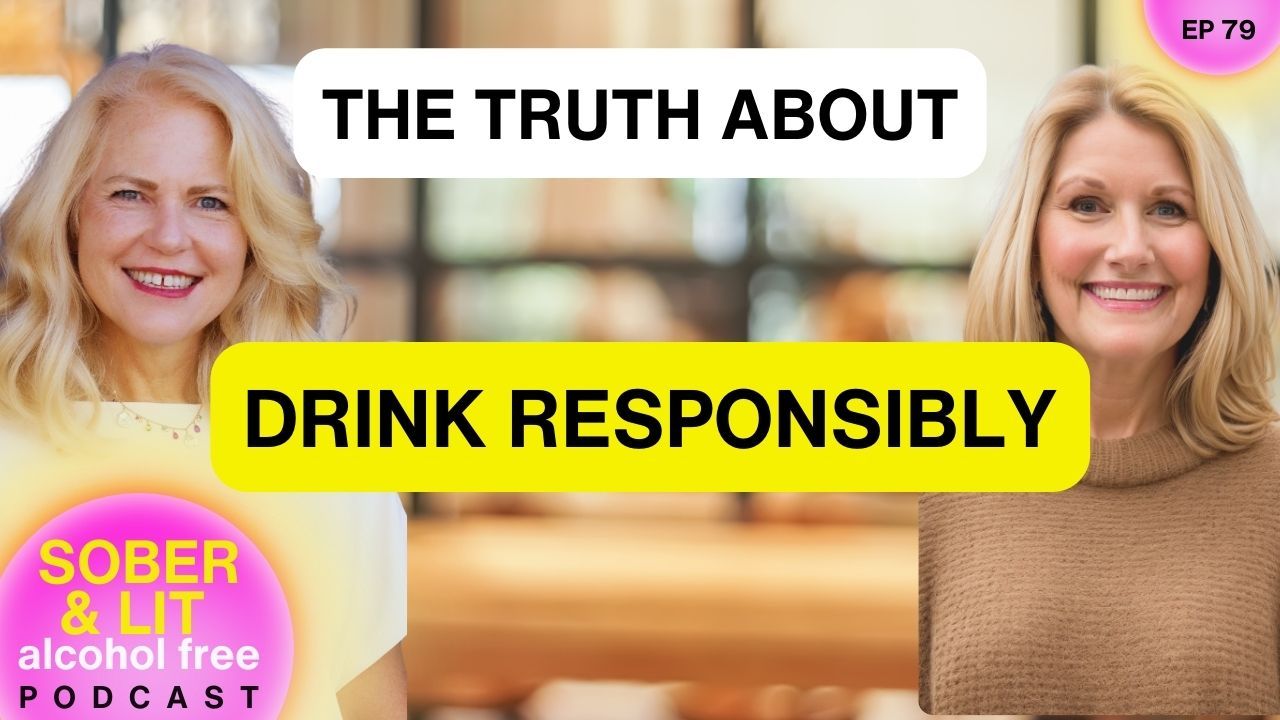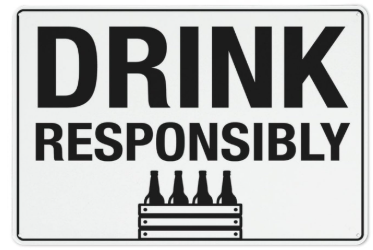Ep. 79 The Truth About 'Drink Responsibly'—What the Alcohol Industry Doesn't Want You to Know
Jul 15, 2025
Listen to the SOBER & LIT PODCAST Here
Watch the Sober & Lit Podcast on YouTube Here

Debunking “Drink Responsibly”: What Does Responsible Drinking Really Mean?
As society questions alcohol’s role in our lives, it’s time to unpack “drink responsibly”—a slogan rooted in marketing, not health. We explore how alcohol advertising shapes beliefs, the myth of responsible consumption, and why a growing number of people are choosing alcohol-free lifestyles.
The Origins and Meaning of “Drink Responsibly”
We’ve all seen it: at the bottom of every alcohol ad or on every wine bottle, the phrase “drink responsibly.” But what does that really mean—and who gets to decide? In a candid conversation, Ruby Williams, a former wine industry insider, and coach Susan Larkin dig deep into the intent behind this catchphrase.
The term “drink responsibly” has become a marketing staple, but as Ruby shares, its roots are less about safety and more about liability. By urging consumers to be responsible, the alcohol industry subtly shifts blame away from its addictive, health-risking products and onto the individual. Much like the tobacco industry’s earlier disclaimers, this phrasing is designed to protect companies in the event of harm, from DUIs to alcohol-related diseases.
But the reality is more complex. Alcohol, as Ruby and Susan discuss, is not just a product but a normalized, addictive substance marketed aggressively to every demographic—including young people and, increasingly, stressed caregivers. The “responsibility” conversation rarely acknowledges alcohol’s nature as a carcinogen or its deeply ingrained presence in celebration and coping rituals.
Marketing, Messaging, and the Power of Normalization
The pressure to consume alcohol isn’t peripheral—it’s persistent and pervasive. Ruby, drawing on two decades in the wine business, describes how messages like “you need a glass of champagne at every social event” weren’t just suggested but mandated. Whether it’s via glitzy ads, romanticized scenes in books and movies, or clever branding, drinking is consistently linked to status, relaxation, and even health.
These narratives are deliberate. By making alcohol synonymous with sophistication, fun, or stress relief, the industry keeps consumers hooked. And, as discussed, there’s a notable focus on “drinking responsibly,” with little practical guidance or context about what responsible drinking looks like—or what it ignores.
The conversation points out how insidious this messaging is, even slipping into seemingly innocuous moments: birthday parties, mothers’ gatherings, kids’ events, and after-work relaxation. The message is always clear—alcohol is the default coping tool.
The Myth of Moderation and the Reality of Health
“Responsible” or “moderate” drinking is often undefined or defined in ways that support more consumption. Many believe having a couple of glasses of wine most nights is moderate. But according to Susan, health authorities like the World Health Organization (WHO) have determined no level of alcohol is actually healthy. In fact, data now suggests that two or fewer drinks per week is the threshold for being considered a non-regular drinker.
The conversation highlights how alcohol by volume (ABV) continues to climb, especially in craft beers, canned cocktails, and wines—making “one drink” more potent than ever. Without clear guidance on serving size and ABV, many people unintentionally exceed responsible limits, increasing their risk for addiction, impaired judgment, and long-term health consequences.
They also discuss the repercussions of using alcohol as a primary coping mechanism. Drinking provides fleeting relief for stress or anxiety, but it also rewires the brain, forming strong subconscious associations between discomfort and the need for alcohol—a pattern that deepens dependence over time.
A Culture Shift: The Sober Curious Movement
Despite the entrenched role of alcohol, more people are rejecting the myth that life’s best moments come with a drink in hand. Ruby notes the rise of the “sober curious” and alcohol-free movements, which have grown alongside increased awareness of alcohol’s risks. With the rise of non-alcoholic spirits and beers (like Athletic Brewing), there are now more options than ever for those seeking different paths to connection and celebration.
These movements often face pushback (being dubbed “neo-prohibitionist” by industry insiders), but as health evidence mounts and social attitudes shift, the conversation is evolving. People are questioning not only how much is “responsible” but whether drinking has any necessary place in their lives at all.
Practicing Gratitude and Reclaiming Joy
The podcast concludes with actionable advice: cultivate daily gratitude. Ruby and Susan suggest that redirecting attention to what’s positive and meaningful can help replace the emotional void many hope to fill with alcohol. Regularly naming things you’re grateful for, even small ones, rewires your brain toward happiness and resilience.
Ultimately, responsible living isn’t about measuring drinks but about questioning long-held beliefs, making empowered choices, and seeking authentic joy—no alcohol required.
____
Listeners have said that our podcast has helped them get alcohol free! So we created Feel Lit 21, a way for you to press your reset button and take a 21 day break from alcohol. Every day you will receive emails with videos, journal prompts, and the inspiration you need to embrace 21 days without alcohol that feels lit!
https://feellitpodcast.com/FeelLit21-sg
Find community and connection on the Feel Lit Alcohol Free Facebook Page: https://www.facebook.com/groups/feellitalcoholfreepodcast
Ruby Williams at Freedom Renegade Coaching https://www.freedomrenegadecoaching.com/
Follow Coach Ruby: @rubywilliamscoaching
Email: [email protected]
